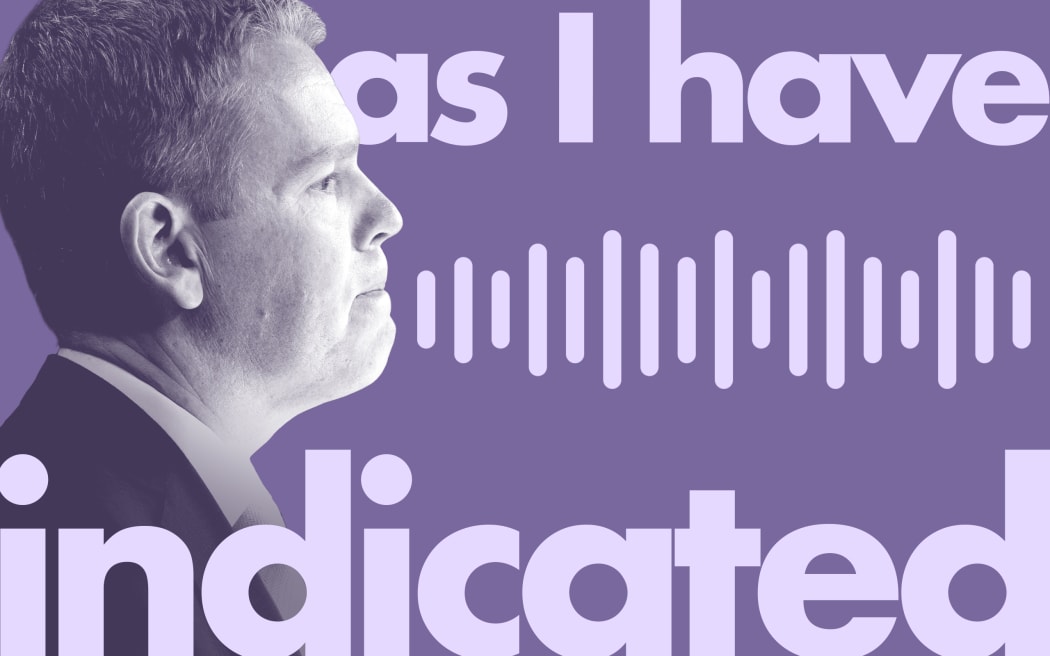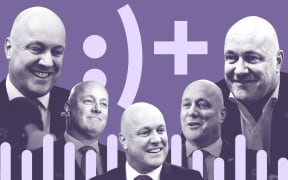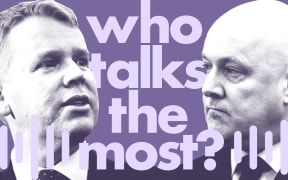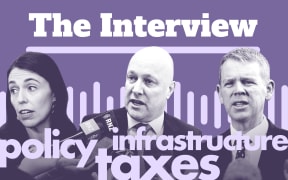
His predecessor used "as I say" - PM Chris Hipkins has a subtly different phrase to redirect a line of questioning he's not keen on. Photo: RNZ
RNZ's analysis of hours of interviews reveals the phrases Chris Hipkins, Jacinda Ardern and Christopher Luxon use most often to block an awkward line of questioning.
We all know that politicians have a habit of not answering the question put to them by pivoting to their talking points, trying to take the conversation back within their comfort zone.
What is less well known is that this is a tried and tested tactic, known as 'block and bridge'. The politician blocks the question, builds a verbal bridge and then skips across it to their happy place of prepared messages.
Former Prime Minister Jacinda Ardern, who has a Bachelor of Communication Studies in Public Relations and Political Science from Waikato Management School, was adept at the technique.
According to RNZ data analysis of political interviews her favourite block and bridge phrase was to insert "as I say" into the interview.
She blocked interviewers with "as I say" 46 times in the nine months monitored by RNZ, moving the interview to ground she felt more comfortable on.
When interviewers persisted and interrupted her Ardern she would deploy the passive-aggressive phrase "if I may" - using it 11 times in the period RNZ monitored.
The extent to which political leaders hammer certain words and phrases - and how they use language to spin their political messages - is revealed in the RNZ series The Interview.
Read more from this series:
RNZ recorded and analysed nine months of weekly interviews with the Labour and National leaders on RNZ, TVNZ, Newshub and Newstalk ZB between July 2022 and May 2023.
The data shows that Prime Minister Chris Hipkins' favoured block and bridge phrase is "as I have indicated" - a phrase he trotted out 31 times in the leader interviews RNZ monitored.
National leader Christopher Luxon has a greater range of block and bridge techniques and deploys them often.
His favourite block and bridge phrase is "the reality is" - a line he used 73 times in his leader interviews.
Luxon used two classic block and bridge lines - "what I can tell you" and "what I am saying" - dozens of times in his media rounds in an effort to defuse questions. He used that phrase - or "what we're saying" when including his team - 75 times in his media interviews.
He used the phrase "as I've said" or "as I say" 68 times, and "I can tell you" 48 times in the period monitored by RNZ.
Hipkins is also keen on that tactic, using "as I've said" or "as I say" 24 times.
Josie Pagani, a former political media advisor and a political commentator with a left-leaning perspective, said the data showed Labour and National were led by politicians of diplomacy rather than conviction.
"The politics of diplomacy means that you latch on to something and you move it quickly to the thing that you want to talk about. The politician of conviction will usually answer the question, disagree passionately and try to persuade you."
She said while media trainers convince politicians that the block and bridge technique will help them avoid awkward questions it often results in a lack of precision, which leads to a lack of trust.
"It's the imprecision which makes people go 'I don't trust you' because I don't know what you're actually saying."
Pagani said looking at the data brought to mind George Orwell, the author of Nineteen Eighty-Four and Animal Farm, whose phrases 'newspeak' and 'doublespeak' are still in common use more than 70 years after his death.
"He talks about 'phrases tacked together, like a prefabricated hen house' so you get things like 'sustainable livelihoods' or 'pathways of learning'." she said.
"When you feel like you don't know what a 'transition to an opportunity for wellbeing and resilience' actually means a politician is going to do, it's usually because they haven't decided exactly what they're going to do or they don't know what to do. So I think people are very untrusting of that kind of waffly language."
Pagani said the rise of the professional politician, which began with Tony Blair and Bill Clinton in the 1990s, had led to more of that language.
She contrasted that with the way former United States President Donald Trump speaks, quoting David Runciman, author of Political Hypocrisy, who observed that people felt that Trump lied authentically, whereas Hillary Clinton was telling the truth inauthentically.
"They feel like Trump is being himself and 'himself' is a lying, ill-disciplined, badly behaved, rude, obnoxious man, and they're going, 'but he's being himself'," she said. "They felt that Hillary Clinton was being careful and sounding like a professional politician: fake politeness, hedging non-answers and they just didn't like it."
Pagani said that John McTernan, who advised Prime Ministers Tony Blair and Julia Gilliard, used the slogan 'edge, crunch, lift' to describe how politicians should communicate.
Edge meant to cut through; crunch referred to being specific enough to allow people to easily discuss the subject and lift was the sense of inspiration.
"Be prepared to be precise and to risk your political career by standing up and talking about something that is real and genuine and practical. People will respond well to that, even if they disagree with you," Pagani said.
"It's really important for all politicians to talk plainly, and communicate clearly to voters and be prepared to persuade if you don't think it's a popular position. Presumably you're in politics to do something that you believe in. So just do it and talk about it."
How we analysed the data:Weekly leader interviews on the following shows were included. Newshub's AM Show, TVNZ Breakfast, RNZ's Morning Report, and Newstalk ZB's Mike Hosking Breakfast Show. In total more than 28 hours of interviews were analysed including 107 interviews with Christopher Luxon, 49 with Jacinda Ardern and 50 with Chris Hipkins. Recordings were transcribed by Otter.ai and then manually cleaned to improve accuracy, however some minor errors may remain. Excessively long preambles to interviews by hosts were shortened to focus on the interviewer and leader exchange. Text was analysed using R and the Quanteda package.






